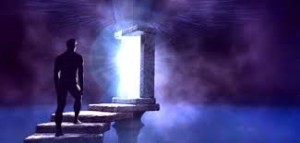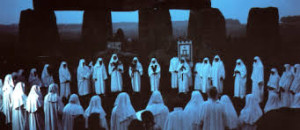Yet man and woman is so gifted that he or she directs his or her experiences and forms his or her civilizations largely through the use of his or her imaginative abilities.
We do not understand this point clearly at all, but our social organizations, our governments — these are based upon imaginative principles. The basis of our most intimate experience, the framework behind all of our organized structures, rest upon a reality that is not considered valid by the very institutions that are formed through its auspices.
It is now bearing Easter, and the yearly commemoration of what is considered historic fact: the [resurrection and] ascension of Christ into heaven. Untold millions have in one way or another commemorated that occasion through the centuries. Private lives have merged with public sentiment and religious fervor. There have been numberless villages festivals, or intimate family gatherings, and church services performed on Easter Sundays now forgotten. There have been bloody wars fought on the same account, and private persecutions in which those who did not agree with one or another’s religious dogmas were quite simply killed “for the good of their souls.”
There have been spiritual rebirths and regenerations — and ungodly slaughter as well, as a result of the meaning of Easter. Blood and flesh have certainly been touched, then, and lives changed in that regard.
All of those religious and political structures that we certainly recognize as valid, arising from the “event” of Christ’s ascension, existed — and do exist — because of an idea. The idea was the result of a spectacular act of the imagination that then leapt upon the historical landscape, highlighting all of the events of the time, so that they became illuminated indeed with a blessed and unearthly light.
The idea of man’s and woman’s survival of death was not new. The idea of a god’s “descent” to earth was ancient. The old religious myths fit a different kind of people, however, and lasted for as many centuries in the past as Christianity has reached into the future. The miraculous merging of imagination with historical time, however, became less and less synchronized, so that only r-i-t-e-s remained and the old gods seized the imagination no longer. The time was ripe for Christianity.
Because man and woman has not understood the characteristics of the world of imagination, he has thus far always insisted upon turning his or her myth into historical fact, for he considers the factual world alone as the real one. A man and woman, literally of flesh and blood, must then prove beyond all doubt that each and every other [human being} survive death — by dying, of course, and then by rising, physically-perceived, into heaven. Each man does survive death, and each woman, but only such a literal-minded species would insist upon the physical death of a god-man as “proof of the pudding.”
Again, Christ was not crucified. The historical Christ, as he is thought of, was a man illuminated by psychic realities, touched with the infinite realization that any one given individual was, by virtue of his or her existence, a contact between All That Is and humankind.
Christ saw that in each person divinity and humanity met — and that man and woman survived death by virtue of his or her existence within the divine. Without exception, all of the horrors connected with Christianity’s name came from “following the letter rather than the spirit of the law,” or by insistence upon literal interpretations — while spiritual, imaginative concepts beneath were ignored.
Again, man and woman directs his or her existence through the use of his or her imagination — a feat that does distinguish him or her from the animals. What connects people and separates them is the power of idea and the force of imagination. Patriotism, family loyalty, political affiliations — the ideas behind these have the greatest practical applications in our world. We project ourselves into time like children through freely imagining our growth. We instantly color physical experience and nature itself with the tints of our unique imaginative processes. Unless we think quite consistently — and deeply — the importance of the imagination quite escapes us, and yet it literally forms the world that we experience and the mass world in which we live.
The theory of evolution, for instance, is an imaginative construct, and yet through its lights some generations now have viewed their world. It is not only that we think of ourselves differently, but we actually experience a different kind of self. Our institutions change their aspects accordingly, so that experience fits the beliefs that we have about it. We act in certain ways. We view the entire universe in a fashion that did not exist before, so that imagination and belief intangibly structure our subjective experience and our objective circumstances.
In all of the other imaginative constructs, for example, whatever their merits and disadvantages, man and woman felt themselves be a part of a plan. The planner might be God, or nature itself, or man or woman within nature or nature within man or woman. There might be many gods or one, but there was a meaning in the inverse. Even the idea of fate gave man and woman something to act against, and roused him or her to action.
The idea of a meaningless universe, however, is in itself a highly creative imaginative act. Animals, for example, could not imagine such an idiocy, so that the theory shows the incredible accomplishment of an obviously ordered mind and intellect that can imagine itself to be the result of non-order, or chaos — [we have] a creature who is capable of “mapping” its own brain, imagining that the brain’s fantastic regulated order could emerge from a reality that itself has no meaning. Indeed, then, the theory actually says that the ordered universe magically emerged — and evolutions must certainly believe in a God of Chance somewhere, or in Coincidence , for their theories would make no sense at all otherwise.
The world of the imagination is indeed our contact with our own source. Its characteristics are the closest to those in Conscious-mind-2 that we can presently encounter. Our experience of history, of the days of our life, is invisibly formed by those ideas that exist in the imagination only, and then are projected upon the physical world. This applies to our individual beliefs about oneself and the way we see oneself in our imagination. We are having wars between the Jews and the Arabs and the Christians once again, because emphasis is put upon literal interpretations of spiritual truths.
In each person the imaginative world, its force and powers, merges into historical reality. In each person, the ultimate and unassailable and unquenchable power of All That Is is individualized, and dwells in time. Man’s and woman’s imagination can carry him or her into those other realms — but when he or she tries to squeeze those truths into frameworks too small, he or she distorts and bends inner realities so that they become jagged dogmas.
The latest growth of fundamentalist has arisen as a countermeasure against the theories of evolution. We have, then, an overcompensation, for in the Darwinian world there was no meaning and no laws. There were no standards of right or wrong, so that large portions of the people felt rootless.
The [fundamentalists] returned to an authoritarian religion in which the slightest act must be regulated. They gave release, and they are giving release, to the emotions, and thus rebelling against scientific intellectualism. They will see the world in black-and-white terms, and thus escape a slippery, thematic universe, in which man’s and woman’s feelings seemed to give him or her no foothold at all.
Unfortunately, the fundamentalists accept literal interpretations of intuitive realities in such a way that they further narrow that channels through which their psychic abilities can flow. The fundamental framework, in this period of time, for all of its fervor, is not rich — as for example Christianity was in the past, with its numerous saints. It is instead a fanatical Puritan vein, peculiarly American in character, and restrictive rather than expansive, for the bursts of emotion are highly structured — that is, the emotions are limited in most areas of life, permitted only an explosive religious expression under certain conditions, when they are not so much spontaneously expressed as suddenly released from the dam of usual repression.
The imagination always seeks expression. It is always creative, and underneath the frameworks of society it provides fresh incentives and new avenues for fulfillment, that can become harnessed through fanatical belief. When this happens our institutions become more repressive, and violence often emerges as a result.
If we look for signs of God’s vengeance we will find them everywhere. An avalanche or a flood or an earthquake will not be seen as a natural act of the earth’s natural creativity, but instead as a punishment from God for sin.
In evolution man’s and woman’s nature is amoral, and anything goes for survival’s sake. There is no possibility of any spiritual survival as far as most evolutionists are concerned. The fundamentalists would rather believe in man’s and woman’s inherent sinful nature, for at least their belief system provides for a framework in which he or she can be saved. Christ’s message was that each man is good inherently, and is an individualized portion of the divine — and yet a civilization based upon that precept has never been attempted. The vast social structures of Christianity were instead based upon man’s and woman’s “sinful” nature — not the organizations and structures that might allow him or her to become good, or to obtain the goodness that Christ quite clearly perceived man or woman already possessed.
It seems almost a sacrilege to say that man and woman are good, when everywhere we meet contradictions, for too often man and woman certainly appears to act as if his or her motives were instead those of a born killer. We have been taught not to trust the very fabric of our being. We cannot expect ourselves to act rationally or altruistically in any consistent manner if we believe that we are automatically degraded, or that our nature is so flawed that such performance is uncharacteristic.
We are a part of nature that has learned to make choices, a part of nature that naturally and automatically produces dreams and beliefs about which we then organize our reality. There are many effects which we do not like, but we possess a unique kind of consciousness, in which each individual has a hand in the overall formation of a world reality, and we are participating at a level of existence in which we are learning how to transform the imaginative realm of probabilities into a more or less specific, physically experience world.
In a way we choose from an infinite, endless, incomputable number of ideas, and sculpt these into the physical fragments that compose normal experience. We do this in such a way that the timeless events are experienced in time, and so that they mix and merge to conform to the dimensions of our reality. Along the way there are accomplishments that are also great failures — but these are failures only in comparison with the glittering inner knowledge of the imagination that holds for us those ideals against which we judge our acts.
Those ideals are present in each individual. They are natural inclinations toward growth and fulfillment.













